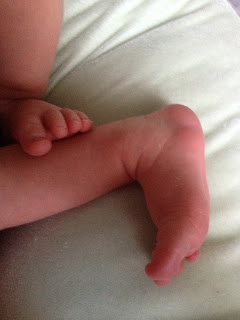and wake up in the calm ..."
I had been listening to a lot of Lou Reed since he died earlier in the week. And perhaps this didn't help much Monday morning when my 16-month-old son's eyes rolled back in his head and his body went stiff while my wife shrieked pleas at him to snap out of it.
He did. He's fine. But I didn't know this as the EMTs scooped him up, strapped him to a stretcher and drove off with him to the hospital, sirens blaring. I didn't know this as I followed in my car with my hazard lights flashing and my fists smacking the steering wheel with every terrifying vision invading my head.
At that point, I could not embrace the apparent grace and beauty of Lou's death as described in Rolling Stone by his wife, Laurie Anderson. All I could think of was something along the lines of: My life is perpetually fucked. I will never recover from this. Please, please don't...
Of course, I wasn't praying. Not to any diety that I'm pretty sure doesn't exist in any form that takes requests from the audience. But I often talk to myself. And then I thought of Lou.
I've always had an affinity for Lou Reed. His music, sure. But also the man. Not that I'd ever met him or even knew an awful lot about him. Just some articles, some interviews. The legend of his prickliness. And one time at an off-Broadway show I saw him sitting in the audience with Steve Martin and Salman Rushdie. At least I like to think they were there together.
Growing up a white, Jewish suburban teenager like me, Reed represented the elevation of the transgressive to true art. Drugs and prostitution and S&M and all manner of sexuality. I imagined he wrote songs in tattoo ink on slabs of New York sidewalk. He always seemed indestructible while at the same time inspiring amazement that he lived this long. And even now that his heart has finally stopped beating, I'm pretty sure he'd get a chuckle from the headline of this Nazi blog post.
Here's a guy who never appeared to give a fuck about anything. But clearly he gave many fucks about many things. He cared greatly about music, particularly the boundaries of what a rock song can explore in terms of subject matter and noise. How many rock stars at the pinnacle of their success could deliver a giant middle-fingered salute as audacious as "Metal Machine Music?"
And he thought big, deep thoughts about big, deep topics. On Elvis Costello's short-lived Sundance Channel show, the artist and director Julian Schnabel came onstage during an interview with Lou to talk about the time Schnabel's father died and he called Lou over to sit as they played all of "Magic and Loss," Reed's song cycle about cancer and death. Which is what the album was intended for in its most extreme sense.
An obsession with death can deny life. But a healthy respect for the one thing we can assure ourselves is coming to us all ... that's clarifying. Liberating. And the horror and beauty of it is that we don't know when. A life of planning and caution can end with a sudden disease or a wrong step.
Or so I couldn't even rationalize as I was speeding to the hospital, which never seemed so goddamned far away. And then behind that goddamned woman in that minivan taking such a goddamned long time to work her way up four goddamned levels of the parking garage, carefully gliding up and then down each speed bump and actually signaling turns while I contemplated abandoning my car in the middle of the thing and running to the ER.
The boy's screams were the most joyous I'd ever heard. At least he was breathing. And after tests ruled out all the really horrible possible problems, we were left with no true cause other than an uncontrollable breath-holding episode that could have triggered a seizure. Hopefully it won't happen again. Though if it does, we will be prepared.
And so we continue to plan. For a life well-lived, whatever that means. This morning, my son and I danced to video of James Brown's 1964 T.A.M.I Show performance. Start with the basics, If figure. He's got time before introducing him to Lou Reed.










